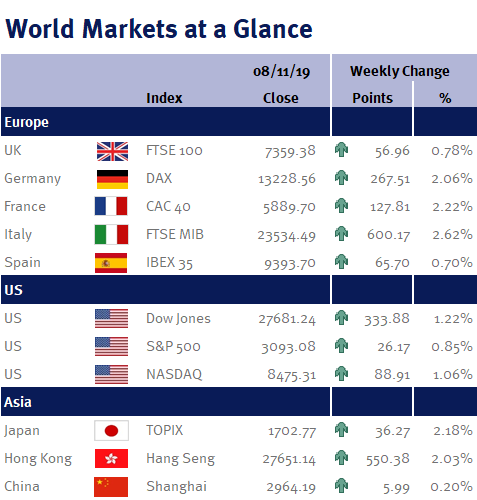As the Brexit extension and general election were widely anticipated, the political noise had little impact on the UK equity market or sterling. The UK equity market didn’t keep pace with the rest of the world, partly because of cautious outlook statements from the major oil companies. BP and Royal Dutch Shell both reported quarterly earnings this week, (collectively the two companies represent more than 15% of the FTSE 100) and whilst they both beat analyst expectations, their cautionary statements caused the shares to fall which weighed on the UK equity market. Similarly in Europe, the Spanish stock market (IBEX-35) was negatively impacted by results from Banco Santander and Deutsche Bank.
It was a busy week in the US as the S&P 500 reached an all-time high thanks to solid economic data and continued positive corporate earnings. US GDP grew 1.9% in the third quarter, beating expectations of 1.6%. Growth was underpinned by the consumer, whose spending has been supported by the lowest level of unemployment in 50 years. Although US unemployment edged up slightly to 3.6% in October from 3.5% in September, non-farm payroll data showed there were an additional 128k jobs created in October (beating estimates of 85k). The tick up in unemployment was reflective of an influx of 325k people into the labour force. From a US company earning perspective, whilst there is still one week to go, over three quarters of companies have so far beaten analyst expectations.
In terms of central banks, there was no change in policy from the Bank of Japan, and whilst the US Fed cut interest rates by 0.25% for the third time this year, they signalled a pause in further cuts unless the economic outlook changes materially.
Next week the Bank of England will announce interest rates, UK general election campaigning gets under way and a new House of Commons speaker will be elected.
Peter Quayle, Fund Manager


